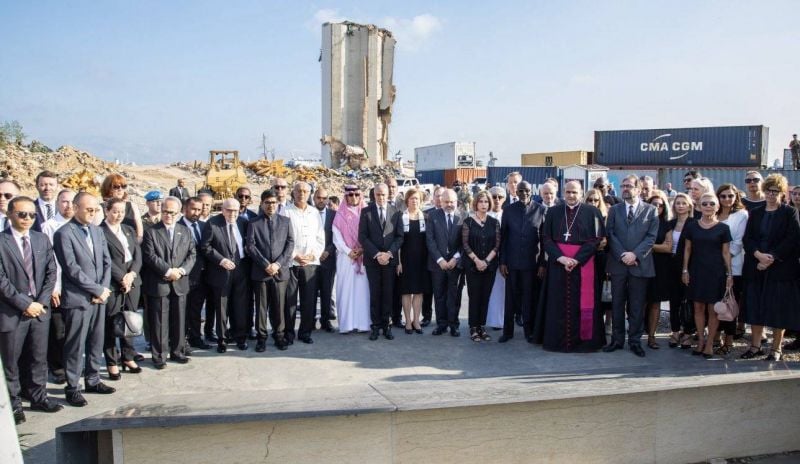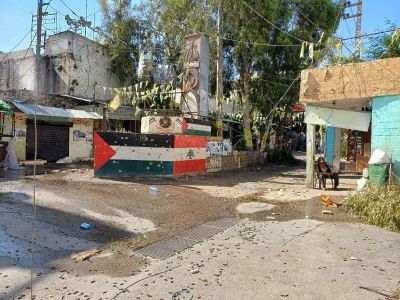
Saudi Ambassador Walid Boukhari alongside other diplomats and officials during a minute of silence at the port of Beirut on Aug. 4, 2023. (Courtesy of Walid Boukhari via Twitter)
The Gulf States’ announcements followed one after the other: Kuwait, Bahrain, the United Arab Emirates, Qatar, and even Oman joined Saudi Arabia in discouraging their nationals from visiting Lebanon during the peak tourist season.
The official reason given for these warnings was the recent violent clashes near Saida, specifically at the Ain al-Hilweh Palestinian refugee camp.
However, it appears that the decision by the Arab embassies is driven more by political rather than security considerations. Notably, significant numbers of tourists from the Gulf States have been avoiding Lebanon for several years now.
The timing of these measures seems to coincide with a visible slowdown in the regional rapprochement between Saudi Arabia on one side and Syria and Iran on the other. Such cooling of relations often has implications for Lebanon and is likely a factor in the Gulf States’ stance.
‘Under Hezbollah’s thumb’
On Friday, Riyadh unexpectedly issued a statement advising its citizens to avoid traveling to Lebanon and urging those already there to leave the country swiftly, due to security concerns.
While only Bahrain also urged its citizens to leave Lebanon, several other Gulf countries subsequently issued reinforced travel recommendations for their nationals in Lebanon.
These announcements followed violent clashes at the Ain al-Hilweh camp near Saida, where at least 13 people died during confrontations between members of the nationalist Fatah movement and Islamist groups.
Many observers believe that tensions were exacerbated by the pro-Iranian Hezbollah, seeking to weaken Fatah and solidify its position in support of its Palestinian ally, Hamas. It is through this lens that some analysts interpret the motivations behind the Gulf countries’ recent announcements.
“Developments in the Ain al-Hilweh camp and calls by some politicians in Lebanon for the Lebanese Army to intervene may cause the conflict to spread throughout the country, which could undermine the security of Arab countries’ nationals,” Umar Karim, an expert in Saudi politics at the University of Birmingham, told L’Orient-Le Jour.
Meanwhile, political scientist Karim Bitar said, “If the decision was purely motivated by security considerations, Saudi Arabia could have simply advised its citizens to avoid high-risk regions.”
“But I believe that Saudi Arabia’s decision is aimed at reaffirming the kingdom’s position, which for several years has been to minimize relations with Lebanon, which Riyadh considers to be a high-risk country under Hezbollah’s thumb,” he added in an interview with L’Orient-Le Jour.
Saudi Arabia has been less politically present in Lebanon for several years, in protest against Iranian hegemony over the country via Hezbollah.
Local actors, in search of funding to emerge from four years of crisis, are hoping for Riyadh’s political return to Lebanon with the election of a new head of state.
However, more than nine months after the end of former President Michel Aoun’s term in office, the presidential vacuum continues, pending a political compromise both at home and abroad.
Hezbollah continues to favor the candidacy of Marada Movement leader Sleiman Frangieh — a choice that is squarely rejected by the Lebanese opposition camp.
Hezbollah seems ready to repeat the scenario that played out between 2014 and 2016 when the party went as far as to block government institutions until Aoun was elected.
Reacting to these warnings and travel bans, Hezbollah MP Ali Fayad expressed strong disapproval, denouncing what he sees as the resurgence of concerning developments and questionable stances within Lebanon.
Fayad said he believes these actions are aimed at destabilizing the country both in terms of its security and political stability. He further suggested that these positions cannot be observed in isolation but should be viewed within the broader context of the pressures facing Lebanon.
On the other hand, MP Walid Joumblatt, who opposes the Hezbollah camp, also expressed surprise at the Arab countries' move. Speaking from Ain al-Tineh, the residence of Speaker Nabih Berri, on Sunday, he stated that he did not understand the reasons behind their actions.
The timing of the Arab countries’ decision to issue travel warnings and bans during the tourist season appears to be a strategic pressure tactic, especially considering Lebanon’s urgent need for foreign currency due to the central bank’s depleted reserves.
According to Middle East researcher Joe Macaron, Saudi Arabia and the United Arab Emirates have consistently been concerned about the security of their citizens in Lebanon. “However, they have also often used travel bans as a means of exerting leverage in Lebanese politics,” he added.
In an effort to address the presidential crisis and urge all parties to find a compromise, Saudi Arabia, backed by the United States, previously proposed suspending tourism to Lebanon as long as the country’s political situation remained unstable.
Saudi Arabia’s partners within the Group of Five (including Qatar and France) called for restraint in the face of these “collective sanctions,” which could further complicate matters, and postponed a decision on potential sanctions until September.
‘Pressure on Iran through Lebanon’
Saudi Arabia’s recent actions, however, came as a surprise and occurred amidst a context of slowing regional détente that was initiated several months prior in Beijing.
While Tehran reopened its embassy in Riyadh nearly two months ago, Saudi Arabia has repeatedly delayed the inauguration of its consulate in Iran.
Last week witnessed disputes between Saudi Arabia, Kuwait and Iran over the Dorra oil field on maritime borders. Both Saudi and Kuwait asserted that they exclusively hold sovereign rights to exploit the resources of this area, contesting Iran’s claims.
“There is a rise in tensions in some respects with Iran, particularly with regard to threats to commercial vessels in Gulf waters,” said Hussein Ibish, a researcher at the Arab Gulf States Institute. “The US is even planning to deploy armed marine guards on board commercial vessels for the first time since the late 1980s.”
Similarly, Saudi relations with the regime of Syrian President Bashar al-Assad are shaky. This comes more than two months after Assad’s triumphant return to the Arab League under apparent Saudi impetus.
According to corroborating sources, Riyadh postponed sine die the reopening of its embassy in Damascus. Lebanon, seen as a proxy for Iran, finds itself stuck between a rock and a hard place.
“There has been a long-standing tendency among Gulf countries to exert indirect pressure on Iran through direct pressure on Lebanon,” Ibish said.
Concurrently, while relations with the Mumanaa (Resistance) axis countries are floundering, Saudi Arabia is silently forging ties with Israel at the instigation of the US, which has been seeking to forge a historic agreement between the two powers before the end of US President Joe Biden’s term in office.
“While pursuing normalization with their Iranian rival, the Saudis are clearly seeking to engage with other stakeholders so as not to be isolated in the event of a break with Iran in the future,” Karim said.
It may also signal a step toward a normalization agreement with Tel Aviv that Saudi Arabia has asked its citizens to leave Lebanon.
“In the event of a treaty being signed with Israel, Saudi Arabia fears for the safety of Saudi nationals in Lebanon,” said Bitar.
“Arab countries believe that there is no way to hold groups like Hezbollah or small armed groups responsible if they attack their citizens,” Ibish explained.“You only have to look at how the investigation into the [Aug.4, 2020,] Beirut port is stalling to realize that Lebanon has little control over the activities of armed groups on its territory and cannot guarantee the safety of foreign citizens.”
The timing of Riyadh’s announcement on Aug. 4 could be perceived as a deliberate and carefully calculated message.
This article was originally published in French in L'Orient-Le Jour. Translation by Sahar Ghoussoub.

